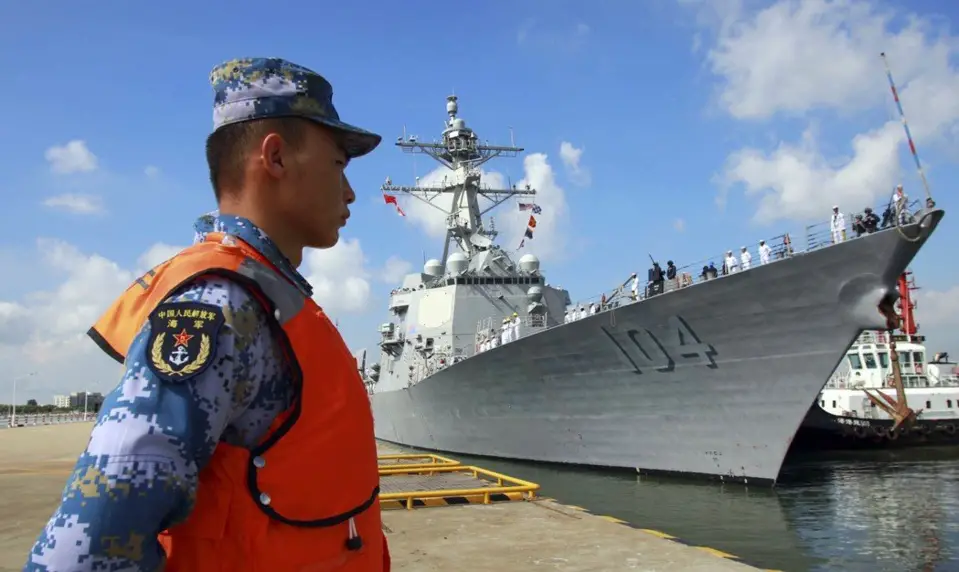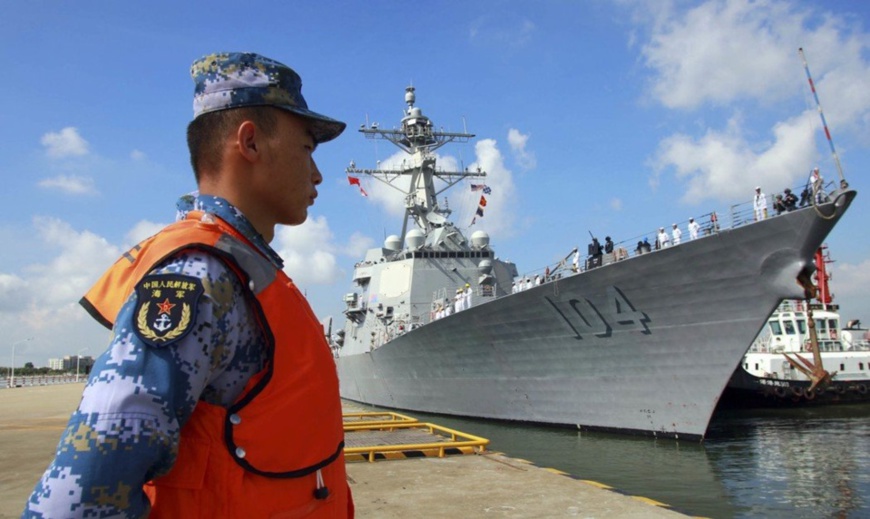By Curtis Stone
According to Western media, China is aggressively building military outposts in the South China Sea in order to push Washington out of Asia. China is hell-bent on dominating Asia—perhaps even the world, at least according to some rabid opponents and critics of China. But as recent events show, it is Washington who is stirring up troubles in the South China Sea, forcing China to beef up its defense capabilities.
Two nuclear-capable US B-52 bombers flew within the vicinity of the Nansha Islands in the South China Sea on Tuesday, according to a report by CNN citing a statement from US Pacific Air Forces. The show of force came days after US Secretary of Defense James Mattis accused China of militarizing the South China Sea.
The use of an offensive strategic weapon for the sole purpose of trying to strike fear into Beijing calls into question the US’s claim that China is using its military power for “intimidation and coercion” in the South China Sea.
The B-52 bomber is a long-standing symbol of US strength and is the backbone of the strike capability of the US Air Force. The long-range bomber is capable of carrying out nuclear missions and is known as an offensive weapon of last resort.
The show of force on China’s doorstep appears to be part of a White House pressure campaign on China. The flyover comes on the heels of a threat to send warships through the Taiwan Strait and other provocations, including a “freedom of navigation” operation in the South China Sea, as well as amid rising anti-China sentiment in the United States.
But if the goal of the flyover was to weaken China’s resolve to protect its territory, it failed miserably. China’s Ministry of Foreign Affairs said on Wednesday that China cannot be intimidated, adding that China will take all necessary steps to defend its national sovereignty and security and uphold peace and stability in the South China Sea.
Speaking at a daily news briefing, Chinese Foreign Ministry spokeswoman Hua Chunying said she hoped the United States could clarify whether it thought sending strategic bombers to China’s doorstep counted as militarization.
“If someone armed to teeth comes to your doorstep every now and then, poking around and showing off muscles, aren't you justified in sharpening vigilance, taking precautions, and increasing defense capacities?” Hua asked rhetorically.
Hua suggested that the United States stop playing up the so-called "militarization" in the South China Sea and stop talking through their hat. She also suggested that the United States stop stirring up trouble before it is too late.
“Running amuck is risky,” Hua said, adding that benefit-seeking behavior comes with a cost.
The pressure campaign shows that Washington is stuck in a Cold War mindset. It is ironic to point the finger at China for rising tensions in the South China Sea, while the United States, the greatest military power on the planet, flaunts its power.
Like a Chinese saying goes, jackals and wolves will be met with force, but a friend will be welcomed with wine. It is absurd to accuse China of “intimidation and coercion” in the South China Sea, but it should be understood that China will beat a wolf at its doorstep.
Source: People’s Daily Online
Two nuclear-capable US B-52 bombers flew within the vicinity of the Nansha Islands in the South China Sea on Tuesday, according to a report by CNN citing a statement from US Pacific Air Forces. The show of force came days after US Secretary of Defense James Mattis accused China of militarizing the South China Sea.
The use of an offensive strategic weapon for the sole purpose of trying to strike fear into Beijing calls into question the US’s claim that China is using its military power for “intimidation and coercion” in the South China Sea.
The B-52 bomber is a long-standing symbol of US strength and is the backbone of the strike capability of the US Air Force. The long-range bomber is capable of carrying out nuclear missions and is known as an offensive weapon of last resort.
The show of force on China’s doorstep appears to be part of a White House pressure campaign on China. The flyover comes on the heels of a threat to send warships through the Taiwan Strait and other provocations, including a “freedom of navigation” operation in the South China Sea, as well as amid rising anti-China sentiment in the United States.
But if the goal of the flyover was to weaken China’s resolve to protect its territory, it failed miserably. China’s Ministry of Foreign Affairs said on Wednesday that China cannot be intimidated, adding that China will take all necessary steps to defend its national sovereignty and security and uphold peace and stability in the South China Sea.
Speaking at a daily news briefing, Chinese Foreign Ministry spokeswoman Hua Chunying said she hoped the United States could clarify whether it thought sending strategic bombers to China’s doorstep counted as militarization.
“If someone armed to teeth comes to your doorstep every now and then, poking around and showing off muscles, aren't you justified in sharpening vigilance, taking precautions, and increasing defense capacities?” Hua asked rhetorically.
Hua suggested that the United States stop playing up the so-called "militarization" in the South China Sea and stop talking through their hat. She also suggested that the United States stop stirring up trouble before it is too late.
“Running amuck is risky,” Hua said, adding that benefit-seeking behavior comes with a cost.
The pressure campaign shows that Washington is stuck in a Cold War mindset. It is ironic to point the finger at China for rising tensions in the South China Sea, while the United States, the greatest military power on the planet, flaunts its power.
Like a Chinese saying goes, jackals and wolves will be met with force, but a friend will be welcomed with wine. It is absurd to accuse China of “intimidation and coercion” in the South China Sea, but it should be understood that China will beat a wolf at its doorstep.
Source: People’s Daily Online
 Menu
Menu
 Op-Ed: US show of force shows who is really militarizing the South China Sea
Op-Ed: US show of force shows who is really militarizing the South China Sea

















